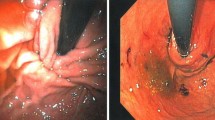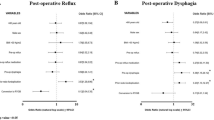Abstract
Background
Recent data suggest that reoperative fundoplication is associated with poor long-term control of reflux. For long-term reflux control, laparoscopic Roux-en-Y gastric bypass (LRYGB) may be a better option. This study assessed outcomes and quality-of-life data after fundoplication takedown and conversion to LRYGB for patients with failed fundoplications.
Methods
After institutional review board approval, the medical records of 25 patients who underwent fundoplication takedown and LRYGB conversion between March 2007 and July 2011 were reviewed. The data recorded included patient demographics, body mass index (BMI), preoperative symptoms, operative duration and findings, hospital length of stay (LOS), estimated blood loss (EBL), length of the follow-up period, and postoperative outcomes. The gastrointestinal quality of life index (GIQLI) and the gastrointestinal symptoms rating scale (GSRS) were used at the most recent follow-up visit to assess symptom severity and quality of life.
Results
The patients in this study had undergone 40 total prior antireflux surgeries. They had a median age of 55 years (range 36–72 years), a BMI of 34.4 kg/m2 (range 22–50 kg/m2), an operative duration of 345 min (range 180–600 min), an EBL of 181 ml (range 50–500 ml), and an LOS of 7 days (range 2–30 days). Five patients had concomitant incisional hernia repair. There was no mortality. Of the 10 patients (40 %) who had had complications, 5 required reoperation. During a 14-month follow-up period (range 1–48 months), 96 % of the patients were reflux-free with a GIQLI score of 114 (range 80–135) and a GSRS score of 25 (range 17–45). Excess weight loss was 60 %, and comorbidity resolution was 70 %. Most of the patients (96 %) were satisfied with their outcome and would undergo the surgery again, and 62 % reported that their personal relationships and sexual life had improved.
Conclusions
Patients who undergo LRYGB after failed fundoplications have excellent symptomatic control of reflux, excellent quality of life, and high rates of satisfaction with their outcome. Nevertheless, because the procedure is challenging and associated with considerable morbidity, it should be performed by surgeons experienced in antireflux and bariatric surgery.
Similar content being viewed by others
References
Anand G, Katz PO (2010) Gastroesophageal reflux disease and obesity. Gastroenterol Clin North Am 39:39–46
Everhart JE, Ruhl CE (2009) Burden of digestive diseases in the United States part I: overall and upper gastrointestinal diseases. Gastroenterology 136:376–386
Iovino P, Angrisani L, Galloro G, Consalvo D, Tremolaterra F, Pascariello A, Ciacci C (2006) Proximal stomach function in obesity with normal or abnormal oesophageal acid exposure. Neurogastroenterol Motil 18:425–432
Aslam M, Slaughter JC, Goutte M, Garrett CG, Hagaman D, Vaezi MF (2012) Nonlinear relationship between body mass index and esophageal acid exposure in the extraesophageal manifestations of reflux. Clin Gastroenterol Hepatol [Epub ahead of print]
Stefanidis D, Hope WW, Kohn GP, Reardon PR, Richardson WS, Fanelli RD (2010) Guidelines for surgical treatment of gastroesophageal reflux disease. Surg Endosc 24:2647–2669
Wang YR, Dempsey DT, Richter JE (2011) Trends and perioperative outcomes of inpatient antireflux surgery in the United States, 1993–2006. Dis Esophagus 24:215–223
Arguedas MR, Heudebert GR, Klapow JC, Centor RM, Eloubeidi MA, Wilcox CM, Spechler SJ (2004) Reexamination of the cost effectiveness of surgical versus medical therapy in patients with gastroesophageal reflux disease: the value of long-term data collection. Am J Gastroenterol 99:1023–1028
Spechler SJ, Lee E, Ahnen D, Goyal RK, Hirano I, Ramirez F, Raufman JP, Sampliner R, Schnell T, Sontag S, Vlahcevic ZR, Young R, Williford W (2001) Long-term outcome of medical and surgical therapies for gastroesophageal reflux disease: follow-up of a randomized controlled trial. JAMA 285:2331–2338
Madan A, Minocha A (2006) Despite high satisfaction, majority of gastro-oesophageal reflux disease patients continue to use proton pump inhibitors after antireflux surgery. Aliment Pharmacol Ther 23:601–605
Perez AR, Moncure AC, Rattner DW (2001) Obesity adversely affects the outcome of antireflux operations. Surg Endosc 15:986–989
Kellogg TA, Andrade R, Maddaus M, Slusarek B, Buchwald H, Ikramuddin S (2007) Anatomic findings and outcomes after antireflux procedures in morbidly obese patients undergoing laparoscopic conversion to Roux-en-Y gastric bypass. Surg Obes Relat Dis 3:52–57 discussion 58–59
Morgenthal CB, Lin E, Shane MD, Hunter JG, Smith CD (2007) Who will fail laparoscopic Nissen fundoplication? Preoperative prediction of long-term outcomes. Surg Endosc 21:1978–1984
Prachand VN, Alverdy JC (2010) Gastroesophageal reflux disease and severe obesity: fundoplication or bariatric surgery? World J Gastroenterol 16:3757–3761
Heniford BT, Matthews BD, Kercher KW, Pollinger H, Sing RF (2002) Surgical experience in fifty-five consecutive reoperative fundoplications. Am Surg 68:949–954 discussion 954
Smith CD, McClusky DA, Rajad MA, Lederman AB, Hunter JG (2005) When fundoplication fails: redo? Ann Surg 241:861–869 discussion 869–871
Awais O, Luketich JD, Schuchert MJ, Morse CR, Wilson J, Gooding WE, Landreneau RJ, Pennathur A (2011) Reoperative antireflux surgery for failed fundoplication: an analysis of outcomes in 275 patients. Ann Thorac Surg 92:1083–1089 discussion 1089–1090
Rosemurgy AS, Arnaoutakis DJ, Thometz DP, Binitie O, Giarelli NB, Bloomston M, Goldin SG, Albrink MH (2004) Reoperative fundoplications are effective treatment for dysphagia and recurrent gastroesophageal reflux. Am Surg 70:1061–1067
Oelschlager BK, Lal DR, Jensen E, Cahill M, Quiroga E, Pellegrini CA (2006) Medium- and long-term outcome of laparoscopic redo fundoplication. Surg Endosc 20:1817–1823
Furnee EJ, Draaisma WA, Broeders IA, Gooszen HG (2009) Surgical reintervention after failed antireflux surgery: a systematic review of the literature. J Gastrointest Surg 13:1539–1549
Dallemagne B, Arenas Sanchez M, Francart D, Perretta S, Weerts J, Markiewicz S, Jehaes C (2011) Long-term results after laparoscopic reoperation for failed antireflux procedures. Br J Surg 98:1581–1587
Varela JE, Hinojosa MW, Nguyen NT (2009) Laparoscopic fundoplication compared with laparoscopic gastric bypass in morbidly obese patients with gastroesophageal reflux disease. Surg Obes Relat Dis 5:139–143
Nguyen SQ, Grams J, Tong W, Sabnis AA, Herron DM (2009) Laparoscopic Roux-en-Y gastric bypass after previous Nissen fundoplication. Surg Obes Relat Dis 5:280–282
Ibele A, Garren M, Gould J (2012) The impact of previous fundoplication on laparoscopic gastric bypass outcomes: a case-control evaluation. Surg Endosc 26:177–181
Houghton SG, Nelson LG, Swain JM, Nesset EM, Kendrick ML, Thompson GB, Murr MM, Nichols FC, Sarr MG (2005) Is Roux-en-Y gastric bypass safe after previous antireflux surgery? Technical feasibility and postoperative symptom assessment. Surg Obes Relat Dis 1:475–480
Raftopoulos I, Awais O, Courcoulas AP, Luketich JD (2004) Laparoscopic gastric bypass after antireflux surgery for the treatment of gastroesophageal reflux in morbidly obese patients: initial experience. Obes Surg 14:1373–1380
Frezza EE, Ikramuddin S, Gourash W, Rakitt T, Kingston A, Luketich J, Schauer P (2002) Symptomatic improvement in gastroesophageal reflux disease (GERD) following laparoscopic Roux-en-Y gastric bypass. Surg Endosc 16:1027–1031
Patterson EJ, Davis DG, Khajanchee Y, Swanstrom LL (2003) Comparison of objective outcomes following laparoscopic Nissen fundoplication versus laparoscopic gastric bypass in the morbidly obese with heartburn. Surg Endosc 17:1561–1565
Smith SC, Edwards CB, Goodman GN (1997) Symptomatic and clinical improvement in morbidly obese patients with gastroesophageal reflux disease following Roux-en-Y gastric bypass. Obes Surg 7:479–484
Jones KB Jr, Allen TV, Manas KJ, McGuinty DP, Wilder WM, Wadsworth ED (1991) Roux-Y gastric bypass: an effective antireflux procedure. Obes Surg 1:295–298
Zainabadi K, Courcoulas AP, Awais O, Raftopoulos I (2008) Laparoscopic revision of Nissen fundoplication to Roux-en-Y gastric bypass in morbidly obese patients. Surg Endosc 22:2737–2740
Eypasch E, Williams JI, Wood-Dauphinee S, Ure BM, Schmulling C, Neugebauer E, Troidl H (1995) Gastrointestinal Quality of Life Index: development, validation and application of a new instrument. Br J Surg 82:216–222
Revicki DA, Wood M, Wiklund I, Crawley J (1998) Reliability and validity of the Gastrointestinal Symptom Rating Scale in patients with gastroesophageal reflux disease. Qual Life Res 7:75–83
Robinson JD, Lupkiewicz SM, Palenik L, Lopez LM, Ariet M (1983) Determination of ideal body weight for drug dosage calculations. Am J Hosp Pharm 40:1016–1019
Makris KI, Lee T, Mittal SK (2009) Roux-en-Y reconstruction for failed fundoplication. J Gastrointest Surg 13:2226–2232
Shafi MA, Pasricha PJ (2007) Postsurgical and obstructive gastroparesis. Curr Gastroenterol Rep 9:280–285
Datta TS, Steele K, Schweitzer M (2010) Laparoscopic revision of gastrojejunostomy revision with truncal vagotomy for persistent marginal ulcer after Roux-en-Y gastric bypass. Surg Obes Relat Dis 6:561–562
Gould J, Ellsmere J, Fanelli R, Hutter M, Jones S, Pratt J, Schauer P, Schirmer B, Schwaitzberg S, Jones DB (2011) Panel report: best practices for the surgical treatment of obesity. Surg Endosc 25:1730–1740
Disclosures
Dimitrios Stefanidis, Fernando Navarro, Vedra A. Augenstein, Keith S. Gersin, and B. Todd Heniford have no conflicts of interest or financial ties to disclose.
Author information
Authors and Affiliations
Corresponding author
Rights and permissions
About this article
Cite this article
Stefanidis, D., Navarro, F., Augenstein, V.A. et al. Laparoscopic fundoplication takedown with conversion to Roux-en-Y gastric bypass leads to excellent reflux control and quality of life after fundoplication failure. Surg Endosc 26, 3521–3527 (2012). https://doi.org/10.1007/s00464-012-2380-7
Received:
Accepted:
Published:
Issue Date:
DOI: https://doi.org/10.1007/s00464-012-2380-7




